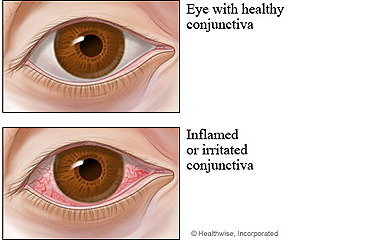
Overview
Pinkeye is a problem that many children get. In pinkeye, the lining of the eyelid and the eye surface become red and swollen. The lining is called the conjunctiva (say "kawn-junk-TY-vuh"). Pinkeye is also called conjunctivitis (say "kun-JUNK-tih-VY-tus").
Pinkeye can be caused by bacteria, a virus, or an allergy.
Your child's pinkeye is caused by bacteria. This type of pinkeye can spread quickly from person to person, usually from touching.
Pinkeye from bacteria usually clears up 2 to 3 days after your child starts treatment with antibiotic eyedrops or ointment.
Follow-up care is a key part of your child's treatment and safety. Be sure to make and go to all appointments, and call your doctor if your child is having problems. It's also a good idea to know your child's test results and keep a list of the medicines your child takes.
How can you care for your child at home?
Use antibiotics as directed
If the doctor gave your child antibiotic medicine, such as an ointment or eyedrops, use it as directed. Do not stop using it just because your child's eyes start to look better. Your child needs to take the full course of antibiotics. If your child isn't able to hold still, have another adult help you with their care.
To put in eyedrops or ointment:
- Tilt your child's head back and pull the lower eyelid down with one finger.
- Drop or squirt the medicine inside the lower lid.
- Have your child close the eye for 30 to 60 seconds to let the drops or ointment move around.
- Keep the bottle tip clean. Do not touch the tip of the bottle or tube to your child's eye, eyelid, eyelashes, or any other surface.
Make your child comfortable
- Use moist cotton or a clean, wet cloth to remove the crust from your child's eyes. Wipe from the inside corner of the eye to the outside. Use a clean part of the cloth for each wipe.
- Put cold or warm wet cloths on your child's eyes a few times a day if the eyes hurt or are itching.
- Do not have your child wear contact lenses until the pinkeye is gone. Clean the contacts and storage case.
- If your child wears disposable contacts, get out a new pair when the eyes have cleared and it is safe to wear contacts again.
Prevent pinkeye from spreading
- Wash your hands and your child's hands often. Always wash them before and after you treat pinkeye or touch your child's eyes or face.
- Do not have your child share towels, pillows, or washcloths while your child has pinkeye. Use clean linens, towels, and washcloths each day.
- Do not share contact lens equipment, containers, or solutions.
- Do not share eye medicine.
When should you call for help?
Call your doctor now or seek immediate medical care if:
- Your child has pain in an eye, not just irritation on the surface.
- Your child has a change in vision or a loss of vision.
- Your child's eye gets worse or is not better within 48 hours after your child started antibiotics.
Watch closely for changes in your child's health, and be sure to contact your doctor if your child has any problems.
Where can you learn more?
Go to http://www.healthwise.net/patientEd
Enter A934 in the search box to learn more about "Pinkeye From Bacteria in Children: Care Instructions".
Current as of: July 31, 2024
Author: Ignite Healthwise, LLC Staff
Clinical Review Board
All Healthwise education is reviewed by a team that includes physicians, nurses, advanced practitioners, registered dieticians, and other healthcare professionals.

